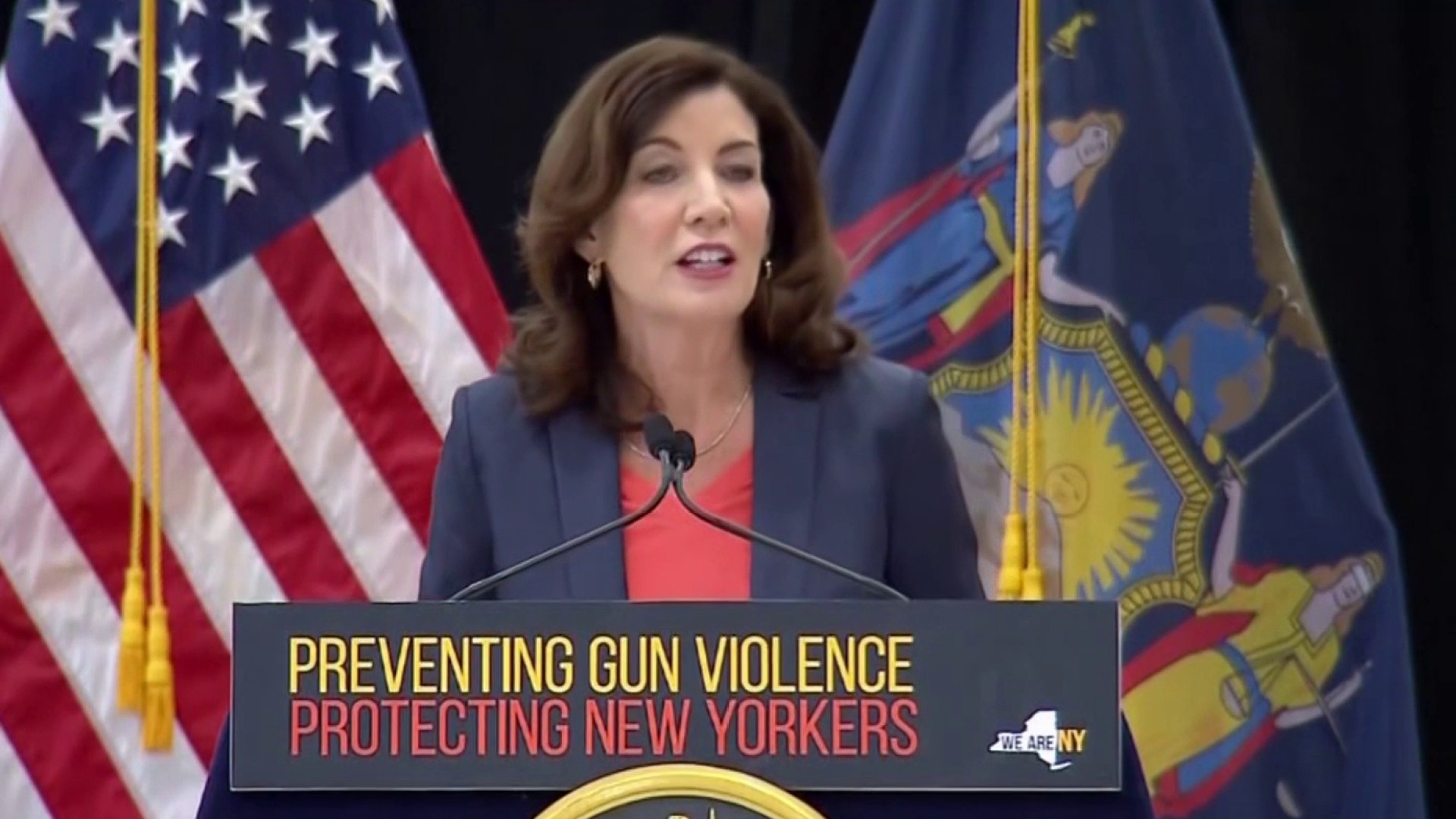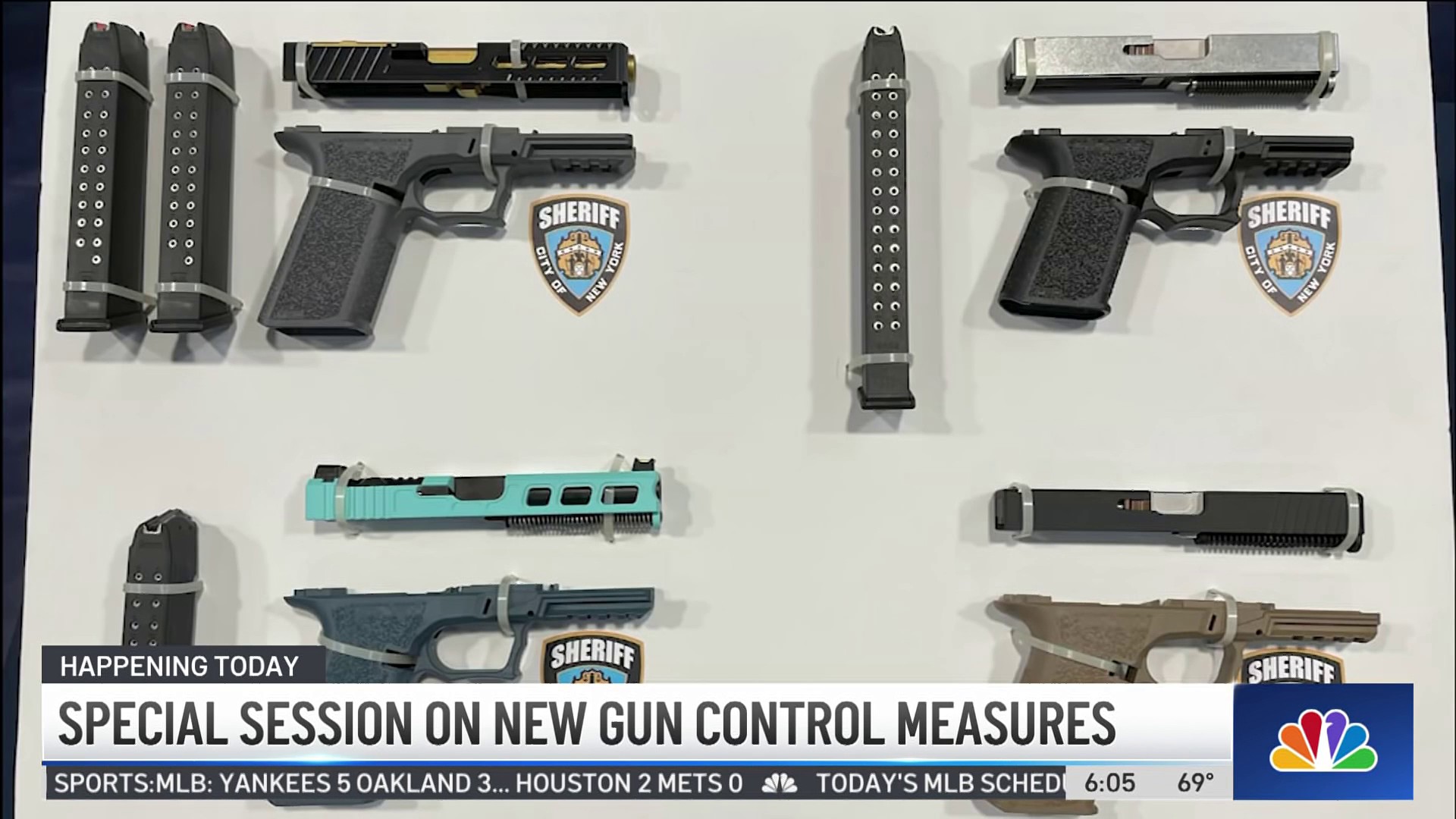New York state's new concealed carry law, a bipartisan reaction to the U.S. Supreme Court's strikedown of the nearly century-old permit restriction in late June, takes effect on Thursday. That means Times Square will be a gun-free zone by local law.
The state Legislature overwhelmingly passed, and Democratic Gov. Kathy Hochul shortly thereafter signed into law, the bill to preserve some firearms limits, especially in "sensitive areas," in the wake of that ruling. Times Square quickly emerged as a hot button of the debate. And Hochul left defining the boundaries to New York City.
"We don’t need people carrying guns in our subways, we don’t people carrying guns in our schools, we don’t need people carrying guns into our places of worship," Hochul said.
Those borders are now set, and New York City is posting temporary signage informing people in Times Square of the new gun law ahead of its official Thursday start. Signage will be posted at other "sensitive locations" in the near future, the city says.
So what do the signs mean? People with a license to carry must have their weapons in a lockbox, whether they are driving or walking, in the areas specified in the map below. Failure to heed those rules for licensed gun carriers comes with a class E felony charge -- and that same criminal offense looms for any non-licensed people caught with a gun in the same zoned area.

Left: The temporary signage that will be posted around Times Square, starting Thursday, September 1st. Right: The boundary of the Times Square “sensitive location” defined under the law, and the locations where signs will be placed.
Get Tri-state area news delivered to your inbox. Sign up for NBC New York's News Headlines newsletter.
Mayor Eric Adams said Wednesday the city would also launch a comprehensive outreach plan to educate New Yorkers about the new state law. The "sensitive locations" are just one component of it. The law also will require concealed carry license applicants to meet revised eligibility requirements and complete a state-regulated firearms training course.
Have questions? An FAQ website launches in New York City on Thursday to answer them, Adams said, so stay tuned.
"The U.S. Supreme Court’s Bruen decision was the shot heard round the world that took dead aim at the safety of all New Yorkers," Adams, a former police officer, said in a statement Wednesday. "New York City will defend itself against this decision, and, beginning tomorrow, new eligibility requirements for concealed carry permit applicants and restrictions on the carrying of concealed weapons in ‘sensitive locations,’ like Times Square, take effect."
"In response to the Supreme Court’s decision to strike down New York’s century-old concealed carry law, we took swift and thoughtful action to keep New Yorkers safe," Hochul added. "I refuse to surrender my right as governor to protect New Yorkers from gun violence or any other form of harm. In New York state, we will continue leading the way forward and implementing common-sense gun safety legislation."
There is also the question: Aside from clear signage, how will the gun-free zones be enforced? NYPD Commissioner Keechant Sewell said that "if there is reasonable suspicion to believe that someone is carrying a firearm, our officers will take action." But that doesn't come without its difficulties, as even those in favor of the bill acknowledge.
"It’s gonna be a challenge when you think about it, because there’s going to be a small population of people who can legally carry guns," Hochul said. "And the question will be for law enforcement to make a determination on whether that person has a legal concealed carry permit."
Breaking Down New NYS Gun Control Law
The measure passed both state legislative chambers by wide margins and earned Hochul's signoff on July 1. Gun rights advocates accused the state of putting still too many restrictions on who can get guns and where to carry them. People supporting more aggressive control said the law strikes the right balance between complying with the Supreme Court ruling and keeping weapons out of the hands of people likely to use them recklessly or with criminal intent, especially when it comes to global landmarks.
More court challenges are still likely.
Among other things, the state’s new rules will require people applying for a handgun license to turn over a list of their social media accounts so officials could verify their “character and conduct.”
Applicants will have to show they have “the essential character, temperament and judgment necessary to be entrusted with a weapon and to use it only in a manner that does not endanger oneself and others.”
As part of that assessment, applicants have to turn over a list of social media accounts they've maintained in the past three years.
People applying for a license to carry a handgun also have to provide four character references, take 16 hours of firearms safety training plus two hours of practice at a range, undergo periodic background checks and turn over contact information for their spouse, domestic partner or any other adults living in their household.
NBC New York has learned that more than 4,600 people applied for gun permits in New York City in 2021, and that trend continued in 2022, with more than 3,900 applications in before September. It’s unclear how many are seeking permits to conceal-carry guns in the streets.
Hochul's chief lawyer, Elizabeth Fine, insisted earlier this summer the state was setting out “a very clear set of eligibility criteria” and noted that the legislation includes an appeals process.
The measure Hochul signed also fixed a recently passed law that barred sales of some types of bullet-resistant vests to the general public. The previous law inadvertently left out many types of body armor, including the type worn by a gunman who killed 10 Black people in a racist attack on a Buffalo supermarket earlier this year.
The Supreme Court’s ruling in June struck down a 109-year-old state law that required people to demonstrate an unusual threat to their safety to qualify for a license to carry a handgun outside their homes. That restriction generally limited the licenses to people who had worked in law enforcement or had another special need that went beyond routine public safety concerns.
Under the new system, the state won't authorize permits for people with criminal convictions within the past five years for driving while intoxicated, menacing or third-degree assault.
Apart from Times Square, the list of "sensitive areas" includes schools, universities, government buildings, places where people have gathered for public protests, health care facilities, places of worship, libraries, public playgrounds and parks, daycare centers, summer camps, addiction and mental health centers, shelters, public transit, bars, theaters, stadiums, museums, polling places and casinos.
New York will also bar people from bringing guns into any business or workplace unless the owners put up signs saying guns are welcome -- a reverse approach from many other states where businesses that don't want guns in their shops are usually required to post signs expressly forbidding them. Failure to heed such signs may result in felony charges.
For Times Square (which for this measure has been defined as 42nd Street to 53rd Street, from Sixth to Ninth avenues), anyone with a concealed carry license must keep their weapon in a locked container. For those who get caught, it would mean a felony with jail time.



